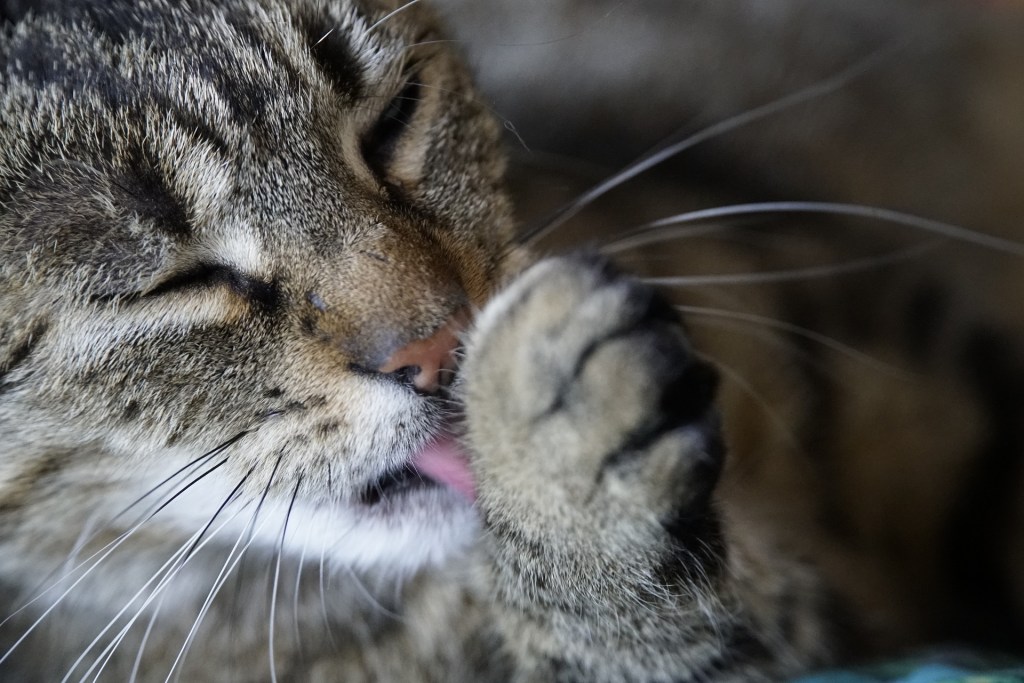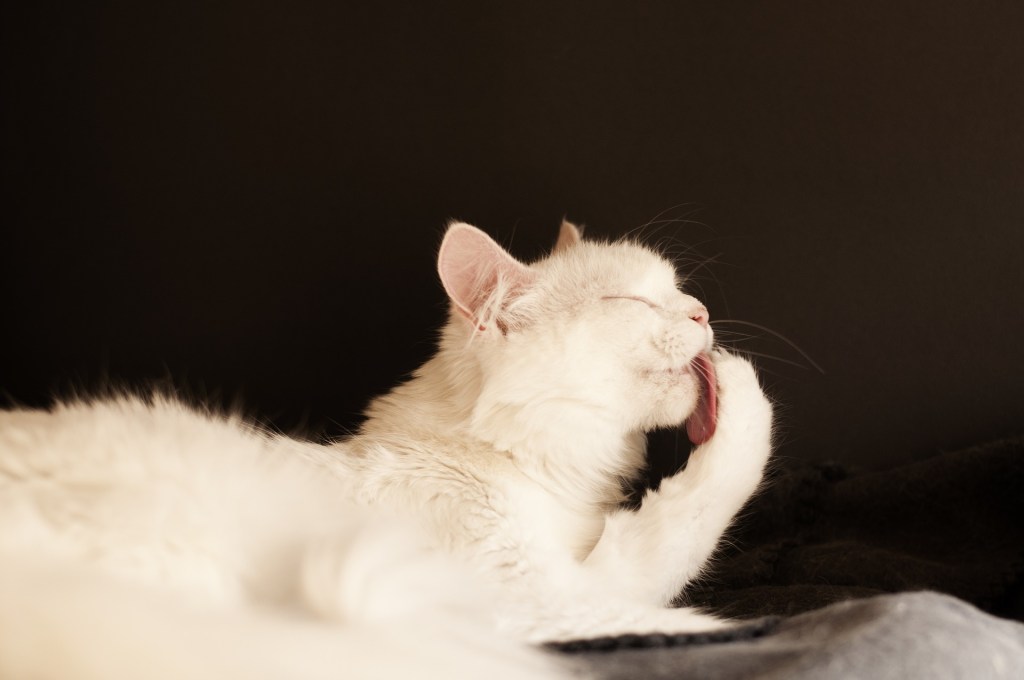If your cat is overgrooming himself, you’ll naturally want to understand what’s causing this behavior. When cats overgroom, they focus on an area or areas and groom them excessively. This can lead to the loss of their hair, and in some cases, cats can give themselves skin sores. There are multiple potential causes of overgrooming, and while you can treat issues like skin sores, it’s important to get to the root of the overgrooming so you can prevent it. If you think your cat has developed this issue, you’ll need to rule out a few potential causes, including physical and emotional ones.

Medical causes behind overgrooming
If you’re wondering, “Why is my cat grooming so much?” the answer could be a medical issue. Skin irritations can make your cat itchy and uncomfortable, and he may excessively groom himself to relieve that discomfort.
- Flea allergies: Some common irritations stem from flea allergies, particularly when the overgrooming occurs at the base of your cat’s tail.
- Ear mites: Ear mites can make your cat itchy around his ears and neck, and you might see overgrooming in that area.
- Food allergies: If your cat is allergic to a food, he might itch all over or might concentrate on a certain area. Other allergens, like pollen, can also prompt this overgrooming response.
- Pain: Pain is sometimes a cause of overgrooming, especially if your cat focuses on one area. Arthritis, urinary tract infections, and other painful issues can cause discomfort, and your cat may try to relieve it by grooming.
Emotional causes behind overgrooming
There may also be an emotional cause behind your cat’s overgrooming. Some cats will groom themselves as a coping strategy when they’re feeling stressed or bored. Grooming can quickly become a habit, though, and your cat may start grooming himself excessively.
Cats who are highly sensitive and strongly attached to their humans may be at an increased risk of developing an overgrooming habit in response to stress or boredom. Changes in your home, like moving to a new house, can create excessive stress in your cat. Other lifestyle changes, like bringing a new pet into the home or welcoming a new baby, can also create significant stress.
Your cat may be at risk of boredom if he’s alone for large parts of the day or doesn’t get enough attention and stimulation. Lack of toys and playtime can contribute to this issue, and a cat who lives as the only pet will depend on you to provide socialization and interaction.

What to do to stop your cat from overgrooming
If your cat starts overgrooming, it’s important to rule out physical issues first. Fleas are one of the most common causes of this issue, so start by flea-combing your cat and looking for flea dirt or fleas themselves. You might also see evidence of fleabites if you part your cat’s fur. If fleas are the cause, then you’ll need to treat your cat with a quality flea preventative, and you’ll also need to address any flea infestation in your home. This can involve vacuuming carpets, washing both human and pet bedding, washing and vacuuming floors, and more. Your vet can recommend additional steps that are appropriate for your cat.
If fleas aren’t the cause, then it’s a good idea to schedule a visit with your vet to have your cat evaluated for other issues. Your vet might recommend a food trial to identify potential food allergies and can also check for signs of pain that might be causing the overgrooming.
Should your cat get a clean bill of health, then it’s time to focus on any emotional causes that might be behind the overgrooming. Think about any changes that occurred before the grooming started. Maybe you moved to a new house or started a new job that changed your schedule. Identifying the cause can help you determine what changes you might need to make to reassure your cat and have him feeling safe and happy again.
Determining the root causes of overgrooming can be a process of elimination, and it may require a bit of investigative work on your part. You may need to change several routines before you find out what works best for your cat. Get your vet involved in the process early on since they may be able to help you narrow down the potential causes and even eliminate physical issues as a culprit. If your cat is reacting to stress, then using pheromones, changing your routine, and even designing your house so your cat has some locations all to himself may help. And if your cat is reacting to boredom, then the solution is often simple: Give your cat a window box, schedule in plenty of playtime, and focus on ways to keep him entertained.
Editors' Recommendations
- How much do hairless cats actually cost?
- Why do cats’ eyes dilate? What your pet’s extra big peepers mean
- Cats chirping at birds is totally normal (and here’s why you should encourage it)
- How to find the right veterinarian for your pet
- Why do cats twitch in their sleep? The real reasons behind this curious behavior


